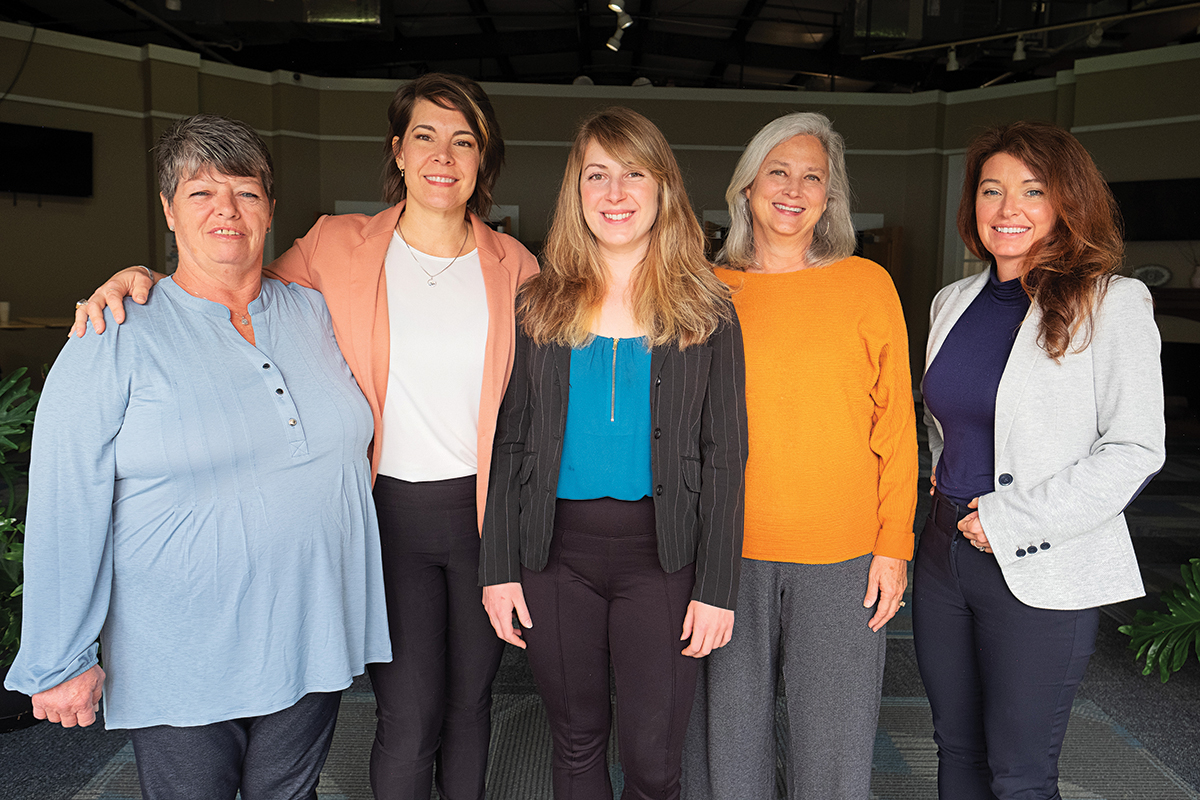Henderson County is first in state to launch innovative youth program

POSITIVE FOCUS
L-R: Sonya Smith (Peer Support Coordinator), Jessi Correa (Operations Manager), Tanya Romanyukha (COSSAP Project Coordinator), Julie Huneycutt (Executive Director),
Dr. Michelle Geiser Program Director)
Photo by Brendan Hunt
The nonprofit Hope Coalition is a community effort dedicated to preventing substance abuse among youth and facilitating long-term drug- and alcohol-addiction recovery. The Henderson County nonprofit relies on volunteers, partners, and an action-oriented small team.
Hope Coalition offers a variety of programs, resources, and outreach events — including an annual Week of Hope that reaches 10,000 local kids each year and a 5k fundraiser this month. The core staff is Coalition Director Julie Huneycutt; Operations Manager Jessi Correa; COSSAP (Comprehensive Opioid, Stimulant, and Substance Abuse Program) Project Coordinator Tanya Romanyukha; Peer Support Coordinator Sonya Smith; and Program Director Michelle Geiser, EdD, a trauma-specialized mental-health professional.
The group recently spearheaded an ambitious initiative called Handle With Care — the first effort of its kind in North Carolina.
What’s different about Handle With Care?
Michelle Geiser, EdD: It’s a pilot program based on a model first started in West Virginia to mitigate the negative impacts of exposure to trauma and violence. If law enforcement encounters a child who was exposed to that kind of incident, they use a three-word code, “Handle With Care,” and send notification to the school with the name of the student. No other information about what occurred is shared.
To protect the child’s privacy?
Yes. This [approach] is never an invitation to engage the child, for instance by saying, “Oh, what happened last night?” Of course, if a student wants help, they can ask for it to initiate that. But “Handle With Care” allows school staff to be aware, so they can observe that child through a different lens. Maybe the student is falling asleep in class, but you [now] realize it wasn’t from staying up all night playing video games … [it’s] because of something that happened that was beyond the child’s control. Then that situation may be handled with another level of sensitivity and care.
How do schools get notified?
Law enforcement has a special phone line to the Director of Student Services for all public schools in the county … [which] they use to send “Handle With Care” notifications. Before the first bell rings to start the school day, the director reaches out to the school with the notification.
Which school staff are trained to appropriately observe or respond?
All of them — bus drivers, teachers, everyone. They’ve all been trained with a strong overview of what to look for in youth [who have] a “Handle With Care” notification. Henderson County was identified as an ideal site to launch this pilot program because we’ve done so much to prime schools to deal with trauma. Hendersonville County schools have trained hundreds of staff, and each school also has a crisis team.
What about the participation of local law enforcement?
We have a very strong relationship with them, and they were excited about the three-day training. They are really supportive to help kids avoid negative behavior outcomes due to circumstances beyond their control.
The program sounds potentially powerful.
A child with six or more of what are called “ACEs,” or “adverse childhood experiences,” is 4,600 percent more likely to became an IV drug user. Knowing that, it’s really significant to get as upstream as possible on prevention. I hope everyone gets on board and this goes statewide to help build trauma-resilient communities.
Hope Coalition’s “Hope for the Holidays Jingle Jog” 5k/fun-run fundraiser happens Saturday, Dec. 18, 9am, starting at 527 Main St., with hot chocolate and cookies to follow. Info at elementsofhope.org/jingle-jog-fundraiser.



